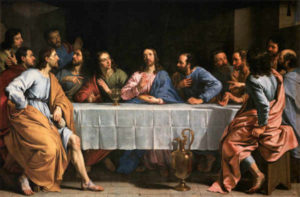Mk 14:12-16, 22-26
On the first day of the Feast of Unleavened Bread,
when they sacrificed the Passover lamb,
Jesus’ disciples said to him,
“Where do you want us to go
and prepare for you to eat the Passover?”
He sent two of his disciples and said to them,
“Go into the city and a man will meet you,
carrying a jar of water.
Follow him.
Wherever he enters, say to the master of the house,
‘The Teacher says, “Where is my guest room
where I may eat the Passover with my disciples?”‘
Then he will show you a large upper room furnished and ready.
Make the preparations for us there.”
The disciples then went off, entered the city,
and found it just as he had told them;
and they prepared the Passover.
While they were eating,
he took bread, said the blessing,
broke it, gave it to them, and said,
“Take it; this is my body.”
Then he took a cup, gave thanks, and gave it to them,
and they all drank from it.
He said to them,
“This is my blood of the covenant,
which will be shed for many.
Amen, I say to you,
I shall not drink again the fruit of the vine
until the day when I drink it new in the kingdom of God.”
Then, after singing a hymn,
they went out to the Mount of Olives.
Bishop Barron:
Friends, today’s Gospel focuses on the spiritual power of the Eucharist. A central claim of the Catholic Church is that Jesus is substantially present under the forms of bread and wine. His presence is not simply evocative and symbolic, but rather real, true, and substantial.
To verify this scripturally, look at the accounts of the Last Supper in Matthew, Mark, and Luke—and also in Paul. But look especially at the sixth chapter of John’s Gospel. Jesus says, “Unless you eat the flesh of the Son of Man and drink his blood, you do not have life within you.” And when they object, Jesus does not soften his language; he intensifies it.
This is the ground for the Church’s defense of the Real Presence. How can we make sense of it? It has everything to do with who Jesus is. If he were simply an ordinary human being, his words would have, at best, a symbolic resonance. But Jesus is God, and what God says, is.
Thus, when Jesus’ words over the bread and wine are spoken, they change into what the words signify. They become really, truly, and substantially the Body and Blood of the Lord.


Recent Comments